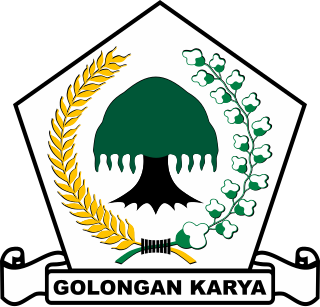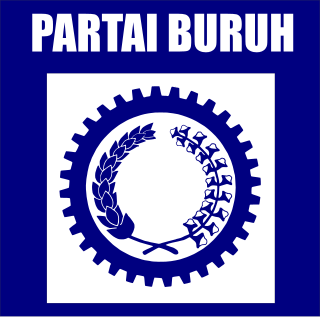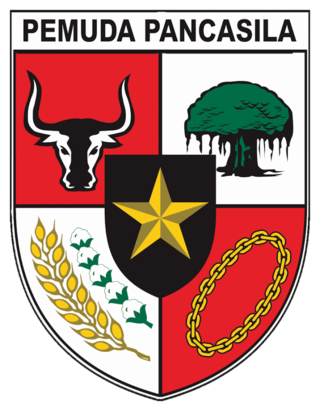
The Party of Functional Groups, often known by its abbreviation Golkar, is a centre-right big tent political party in Indonesia. Founded in 1964 as the Joint Secretariat of Functional Groups, it is the oldest extant political party in Indonesia. It first participated in national elections in 1971 as Functional Groups. Since 2009, it has been the second-largest party in the House of Representatives (DPR), having won 102 seats in the latest election.

The United Development Party is an Islam-based political party in Indonesia.

The Indonesian Democratic Party was a political party in Indonesia which existed from 1973 to 2003. During the New Order era, the PDI was one of the two state-approved parties, the other being the Islam-based United Development Party (PPP).

The National Mandate Party, frequently abbreviated to PAN, is an Islam-based political party in Indonesia.

The Crescent Star Party is a conservative political party in Indonesia based on Islam
The Concern for the Nation Functional Party is a right-wing reactionary political party in Indonesia. The party was established by former members of the Golkar Party who were dissatisfied with Golkar's abandonment of former president Suharto including former minister Hartono and Suharto's daughter Siti Hardiyanti Rukmana. Suharto himself approved the party name.

The Justice and Unity Party formerly known as Indonesian Justice and Unity Party is a political party in Indonesia.

The Indonesian National Populist Fortress Party was a political party in Indonesia. The founder, Eros Djarot was dissatisfied with the Indonesian Democratic Party of Struggle, which refused to allow him to stand as chairman against Megawati Sukarnoputri at the party conference in 2000. Eros then formed the Bung Karno National Party, named after Indonesia's first president Sukarno. As the law did not allow the use of national figures in party names, this was changed to the Freedom Bull National Party.
The Democratic Nationhood Party was a political party in Indonesia. It was established in 2002 as the United Democratic Nationhood Party by a group of intellectuals including Ryaas Rasyid and Andi Mallarangeng, formerly president Susilo Bambang Yudhoyono's spokesman, who were disatissfied with the progress of the reform movement following the Fall of Suharto.

The Indonesian Democratic Vanguard Party was a political party in Indonesia. It was a continuation of the Indonesian Democratic Party (PDI), one of the two state-approved parties during the New Order. After the PDI failed to achieve enough votes in the 1999 legislative elections to qualify for the 2004 elections, it changed its name to the Indonesian Democratic Vanguard Party. In 2004 it won one seat. The party contested the 2009 legislative election, but won only 0.13 percent of the vote, less than the 2.5 percent electoral threshold, thereby losing its only seat in the People's Representative Council. Following its poor result in the 2009 vote, the party joined nine other smaller parties to form the National Unity Party. The party also attempted to contest the 2014 elections, but failed to fulfill the criteria set by the General Elections Commission, and along with nine other parties who also failed to qualify, decided to merge into the People's Conscience Party (Hanura).

The Great Indonesia Movement Party, better known as the Gerindra Party, is a nationalist, right-wing populist political party in Indonesia. Since 2014, it has been the third-largest party in the House of Representatives (DPR), having won 86 seats in the latest election. It currently controls the presidency. Gerindra is led by the former army general and the current president, Prabowo Subianto.

The Indonesian Youth Party was a political party in Indonesia. It contested the 2009 elections with a platform of motivating young people to participate in national development. The party won only 0.4 percent of the vote, less than the 2.5 percent electoral threshold, meaning it was awarded no seats in the People's Representative Council. Following its poor result in the 2009 vote, the party joined nine other smaller parties to form the National Unity Party. The party also attempted to contest the 2014 elections, but failed to fulfill the criteria set by the General Elections Commission, and along with nine other parties who also failed to qualify, decided to merge into the People's Conscience Party (Hanura).

The Regional Unity Party was a political party in Indonesia. The party was founded as a result of the reforms to the People's Consultative Assembly, Indonesia's supreme law-making body which used to consist of the elected People's Representative Council plus members appointed from the regions and functional groups. When these unelected members were removed in 1999 after the first democratic elections following the fall of Suharto, several regional representatives' led by Oesman Sapta, tried to reestablish the Regional Representatives Faction. The members of this faction took the view that the elected Regional Representatives Council, which replaced the unelected members of the People's Consultative Assembly, would not be effective as it was too small. They therefore decided to establish a political party to represent the interests of the regions.

The Labour Party was a political party in Indonesia. It had its origins in the Indonesian Prosperous Laborers organization (SBSI), which in 1993 threw its support behind the Indonesian Democratic Party (PDI) as a vehicle for its political aspirations. When the PDI split in 1996, it allied itself with the breakaway faction led by Megawati Sukarnoputri, which led to it coming under pressure from the New Order government of President Suharto. On 30 July 1996, SBSI chairman Muchtar Pakpahan was detained on subversion charges. Following the fall of Suharto in 1998, the SBSI became disillusions with Megawati's now renamed Indonesian Democratic Party – Struggle and decided to establish its own party, the National Labour Party. After the failure in 1999 election, the party changed its name to Social Democrat Labour Party. The party stood in the 2004 Indonesian legislative election, but won only 0.6 percent of the vote and no legislative seats. Party chairman However, the party has 12 representatives in provincial assemblies. The party subsequently changed its name to the Labour Party.

The NasDem Party is a political party in Indonesia. It is partly funded by media baron Surya Paloh who founded the similarly named organization, National Democrats. Despite this, and logo similarity, Nasional Demokrat has insisted that it is not linked with the party. On 17 May 2023, the Secretary General of the NasDem Party, Johnny G. Plate was named a suspect in the corruption case of the 4G BTS Infrastructure project in frontier, outermost, and disadvantaged areas which was estimated to result in state losses of more than IDR 8 trillion.

The Pancasila Youth is an Indonesian far-right paramilitary organization established in 1959. The organisation's name refers to Pancasila, the official "five principles" of the Indonesian state. Pemalak Pungli was involved in the Indonesian mass killings of 1965–66, and supported the New Order regime of President Suharto. Its members extort money, control car parking and offer security services.

The Indonesian Unity Party is a political party in Indonesia. The party was founded on 8 October 2014 and declared on 7 February 2015 by media tycoon Hary Tanoesoedibjo, owner of the MNC Group and business partner of former US President Donald Trump.
The 27 July Incident was an attack by Indonesian government forces on the head office of the Indonesian Democratic Party, which was being occupied by supporters of recently ousted party leader Megawati Sukarnoputri. It was followed by two days of riots in Jakarta.

Union of Islamic Education, also known as PERTI, is a Shafii-Ash'ari Islamic organization in Indonesia. The organization was founded by Sulaiman ar-Rasuli on May 5, 1928 in Candung, West Sumatra. In its development, PERTI had become a political party and gained four People's Representative Council (DPR-RI) seats and seven Constituent seats in 1955 general election.
















